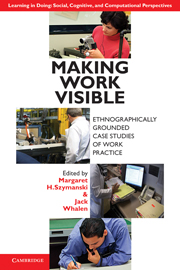Book contents
- Frontmatter
- Contents
- List of Figures and Excerpts
- List of Tables
- List of Contributors
- Series Foreword
- Foreword by John Seely Brown
- Acknowledgments
- Introduction
- Part I Work Practice Study in Historical Context
- Part II Applying Work Practice Methods
- Part III Practices around Documents
- 6 Exploring Documents and the Future of Work
- 7 New Ways of Working
- 8 Behind the Scenes
- 9 Seeing the Right Color
- Part IV The Customer Front
- Part V Learning and Knowledge Sharing
- Part VI Competency Transfer
- References
- Index
- LEARNING IN DOING: SOCIAL, COGNITIVE AND COMPUTATIONAL PERSPECTIVES
6 - Exploring Documents and the Future of Work
Published online by Cambridge University Press: 05 August 2012
- Frontmatter
- Contents
- List of Figures and Excerpts
- List of Tables
- List of Contributors
- Series Foreword
- Foreword by John Seely Brown
- Acknowledgments
- Introduction
- Part I Work Practice Study in Historical Context
- Part II Applying Work Practice Methods
- Part III Practices around Documents
- 6 Exploring Documents and the Future of Work
- 7 New Ways of Working
- 8 Behind the Scenes
- 9 Seeing the Right Color
- Part IV The Customer Front
- Part V Learning and Knowledge Sharing
- Part VI Competency Transfer
- References
- Index
- LEARNING IN DOING: SOCIAL, COGNITIVE AND COMPUTATIONAL PERSPECTIVES
Summary
Rapid sociotechnical change is underway in the world of everyday work. The number of remote and mobile workers is increasing over time (World at Work, 2007). Large corporations are reducing real estate costs by asking employees to work at home. A 2006 report by Forrester noted that 11,400 Hewlett Packard employees work from home and nearly all Jet Blue sales agents work from home. This same report said that 42% of the 320,000 IBM employees worldwide do not have traditional offices. Sun Microsystems allows employees to choose between working in a static office, working exclusively from home, or working in drop-in office spaces (Driver, 2006).
Mobile technology has evolved enough to allow people to work almost anytime, anywhere. Millions of people now work in coffee shops, restaurants, cars, airports, and parks (World at Work, 2007). The worldwide shipment of smart phones is exploding (McGrath, 2009). These smart phones allow users to browse the internet from their phone, and have led to an explosion in the number of applications written specifically for these phones (Anderson, 2008). For example, the iPhone is linked to an applications store containing thousands of applications, ranging from games to business management solutions.
The world of work has also been impacted by changes in the workforce. The older members of Generation Y have just started to enter the workforce. This generation, born between the years of 1979 and 1995, has grown up with digital technology.
- Type
- Chapter
- Information
- Making Work VisibleEthnographically Grounded Case Studies of Work Practice, pp. 109 - 127Publisher: Cambridge University PressPrint publication year: 2011

